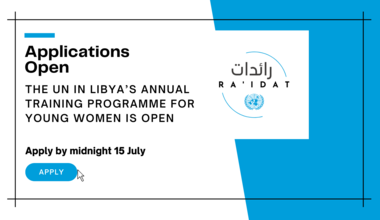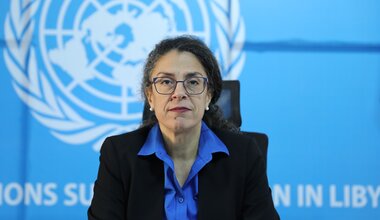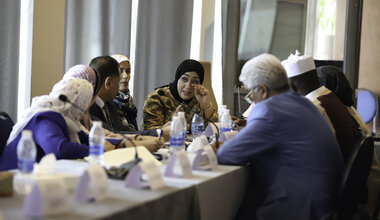UNSMIL and Prison Directors - A Discussion on How to Improve Libyan Prisons
Holding a chart in one hand and a microphone in another, the moderator turned to the audience and asked: “I want to fix the water system. I want to improve the visitors’ rooms. What to do? That’s why a Development Section is needed. I want to even purchase ink for a printer, who to ask? That’s why a Financial Section is needed.”
A similar discussion was over the Clinic and health conditions, the reception area, and other aspects of a given prison.
One in the audience of about 30 prison directors and officials responded: “We have a section for Deposits that we use for purchases.” The moderator from the UN Support Mission in Libya (UNSMIL), Corrections Officer Khaled Al-Majali, responded: “That is one, which means you need a financial section.”
Similar discussions went on for two days, from the structure of a prison to the relationship among directors and officials as well as with inmates and the Justice Ministry.
Convened under the theme “Strong Leaders Make Strong Institutions”, the 14-15 December 2013 roundtable discussion of prison directors explored new ways to help the directors improve the conditions at Corrections and Rehabilitation Institutions. They discussed common general problems and the challenges they face in terms of work relations and management of inmates, shared their experiences and also were informed about the objectives of UNSMIL’s mandate in relation to corrections institutions and human rights.
“It is an opportunity for the directors to meet in one place to discuss the challenges they face and build a communication network for consultation and exchange of expertise and information,” Urwah Alhabahbeh, another Corrections Officer at UNSMIL, told the audience.
After the two-day discussions, recommendations were made that call for developing the prisons, improving the infrastructure and services, ensuring coordination, security, fairness and applying the principles of human rights as well as calling for rejecting revenge and speeding up legal procedures.
Ahmed Ghanem, the head of the Rule of Law section at UNSMIL, announced the recommendations at the closing session. He said the aim of these recommendations is to “become the core for joint action” in the next period.
During the discussions, there were complaints about too much theoretical and too little practical efforts. One official also complained that short training sessions may not do the job and suggested longer term training programs for prison officials. Another demanded establishment of a followup committee. Still, in general, there was agreement that there was benefit from holding such discussions.
“Our goal is to seek the best for prisons and their conditions and any interaction with international expertise brings us benefits,” said Colonel Za’ed Al-Khatabi, Judicial Police Commander for Zawiya area where there are four prisons housing up to 750 inmates.
He added that an additional benefit is that United Nations involvement in the effort would mean the recommendations could get implemented in a faster way than going through the Libyan bureaucratic red tape. “The State has enough problems of its own and that’s why through the (UN) Mission the voice gets through and reaches faster.”
The Director of the Ain Zara Prison in Tripoli, where 750 inmates are held, said there was great merit in the discussions. “We are thuwar who joined the Judicial Police. We did not see great experience,” said Mohamed Mustafa Zeid. The director added that the benefit is in exchanging expertise and how to lift the conditions to the minimum acceptable human rights level.
Justice Minister Salah Marghani, who attended the closing session, said the problems facing the prisons in Libya date back to the former regime and possibly some mistakes were made since the 2011 revolution. Protests were held outside prisons while other prisons were attacked, he said, adding that a plan to overhaul the prison system will begin in 2014.
He thanked UNSMIL for its support for the Judicial Police and extended thanks to organizations that offer criticism. “A friend is he who points to our shortcomings,” he said.
Referring to a UN report on torture and deaths in Libyan prisons that was released in October, the Minister said the document carries a lot of facts. “We don’t want deaths in Libyan prisons. We want the application of the law and reform.”
Captain Fathi Abdelaziz, director of the Majer prison in Zlitan, was optimistic after the conclusion of the roundtable despite some misgivings about slow implementation of what was learned.
“We have had all this before – training abroad, lectures and forums,” he said in an interview. “We have a problem with application, given the capacity and the state of the State after the revolution. The problem is in the slow pace.”
---------------------------------------
Article by:
Samir F. Ghattas
UNSMIL Public Information & Communication Section
 United Nations Peacekeeping
United Nations Peacekeeping UN
UN









